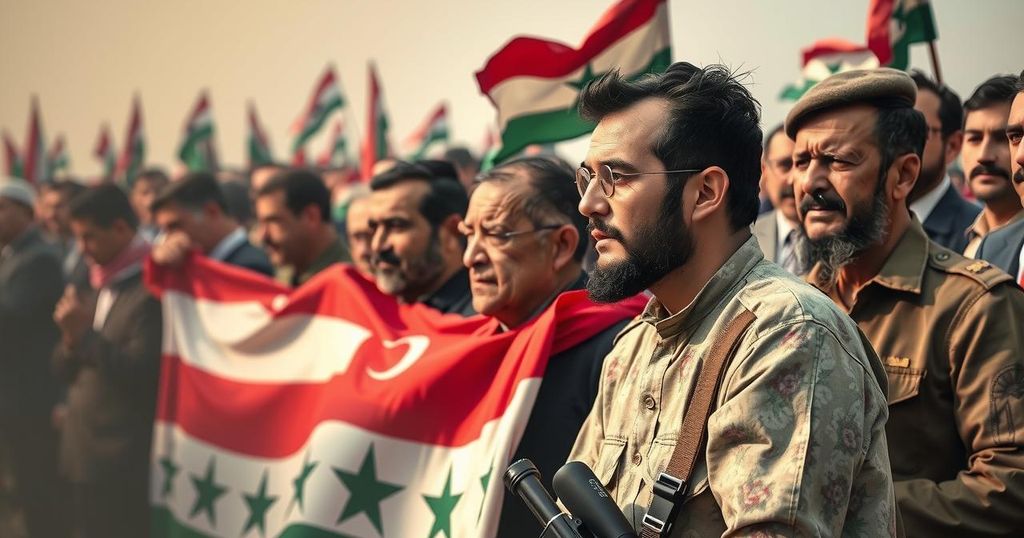Global news
ASIA, CONFLICT RESOLUTION, DAMASCUS, DIPLOMACY, EUROPE, EUROPE/ASIA, EUROPEAN UNION, FRANCE, INTERNATIONAL RELATIONS, ISLAMIC STATE, JIHADIST GROUPS, KURDISH FORCES, KURDISH NATIONAL COUNCIL, KURDISTAN DEMOCRATIC PARTY, MA, MAZLOUM ABDI, OS, OSO, SUL, SULAIMAN OSO, SYRIA, SYRIAN CONFLICT, TURKEY
Fatima Khan
0 Comments
Kurdish Efforts for Unified Representation in Post-Assad Syria
Kurdish political factions in Syria are seeking unity in representation to effectively negotiate with new authorities in the post-Assad landscape. Recent meetings between the ENKS and SDF indicate progress, yet trust issues and external threats persist, complicating their efforts for a collective political strategy. The involvement of international powers emphasizes the significance of safeguarding Kurdish rights amidst a restructured Syrian political scene.
In the context of the ongoing political shifts in Syria, Kurdish factions, particularly those represented by the Syrian Democratic Forces (SDF) and the Kurdish National Council (ENKS), are striving for a cohesive representation to engage with the new Syrian authorities. Since gaining control in 2012, the SDF has become a pivotal partner for the United States in combating the Islamic State, operating largely under the Democratic Union Party (PYD). However, these Kurdish groups face challenges with external players, primarily Turkey, which designates them as extensions of the PKK—a group labeled as terrorist by multiple nations.
Recently, representatives from the ENKS and SDF convened to discuss the formation of a unified Kurdish stance, a meeting facilitated by officials from the U.S.-led anti-IS coalition. This gathering aimed to address contentious issues and outline a collective approach towards negotiations with Damascus. ENKS President Sulaiman Oso characterized the discussions as transparent, emphasizing the need for resolution of internal grievances before presenting a united front.
Despite this progress, trust between factions remains fragile. Oso articulated that the ENKS could not move forward without addressing ongoing targeting of its members, a predicament that diminishes the potential for a unified delegation to Damascus. Both U.S. and European powers have recognized the urgency of safeguarding the rights of Syria’s ethnic minorities, including the Kurds, underscoring the importance of solidarity among Kurdish groups.
Saleh Muslim, a senior figure within the PYD, highlighted the necessity for a delegation inclusive of not only Kurdish representatives but also Arabs and Christians from the northeast. This inclusive approach is deemed crucial for gaining legitimacy in advocating for regional rights and representation. Meanwhile, the ENKS has initiated meetings in Damascus not directly with the newly formed authorities but with community leaders, as discussions continue over the potential integration of Kurdish voices within the political framework of post-Assad Syria.
The political dynamics are further complicated by the stance of Hayat Tahrir al-Sham (HTS), the rebel group currently dominant in opposition circles. Although HTS has proclaimed intentions to protect Kurdish rights, its rejection of federalism highlights the complexities facing Kurdish aspirations in Syria. Observers caution that prolonged divisions may undermine Kurdish political leverage, urging the necessity for a strong and unified representation to articulate distinctive demands in Damascus. Analysts assert that a failure to solidify Kurdish interests could result in marginalization within the broader political reconfiguration of Syria’s future.
The Syrian civil war has engendered a fragmented landscape where ethnic and political groups vie for influence in the post-Assad era. The Kurdish forces, particularly through the SDF and PYD, have established significant control over northeast Syria amid international support against terrorist groups. Nevertheless, these factions are divided, with the ENKS opposing the traditional authority of the PYD and aligning more closely with Turkey and the Kurdistan Democratic Party of Iraq. In this current phase, establishing a unified Kurdish representation becomes critical as new political structures are forming in Syria devoid of the Assad regime, raising concerns about the future rights and recognition of Kurdish people in the region.
In summary, the pursuit of a unified Kurdish representation in post-Assad Syria is marked by complex inter-factional dynamics and external pressures. The recent meetings between the ENKS and SDF signal a potential step towards cohesion, although significant hurdles remain. Trust deficits and targeted aggression against ENKS members exacerbate the challenge of presenting a united front to the authorities in Damascus. As the Kurdish groups navigate these obstacles, their ability to secure representation hinges on overcoming internal divisions and forging broader alliances within the diverse ethnic landscape of northeast Syria, all while responding to the significant geopolitical considerations posed by actors such as Turkey and HTS.
Original Source: www.voanews.com




Post Comment